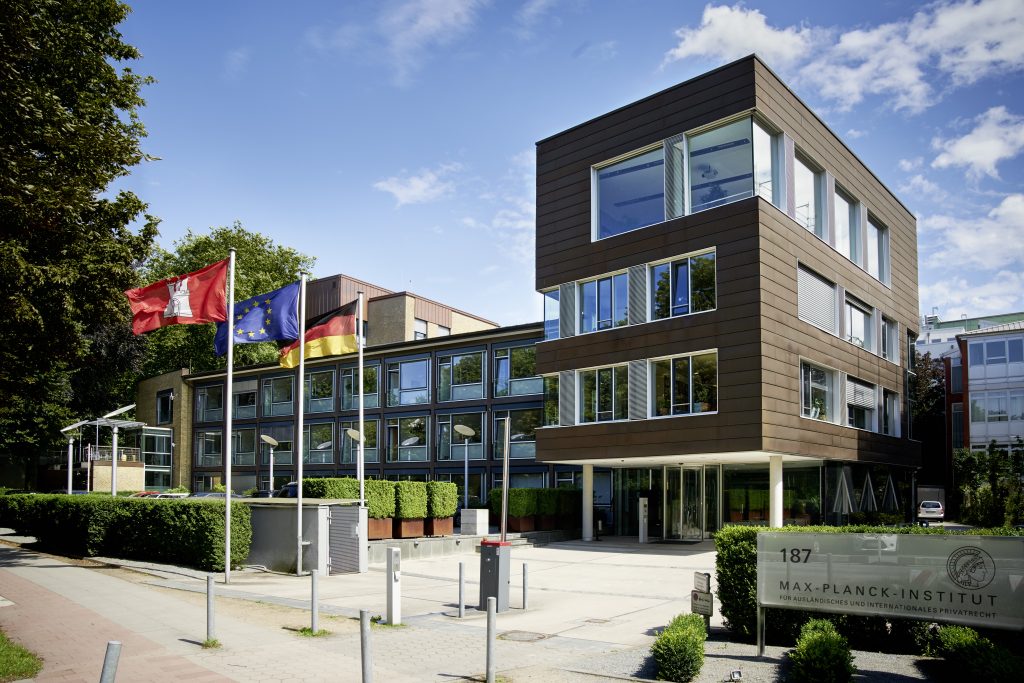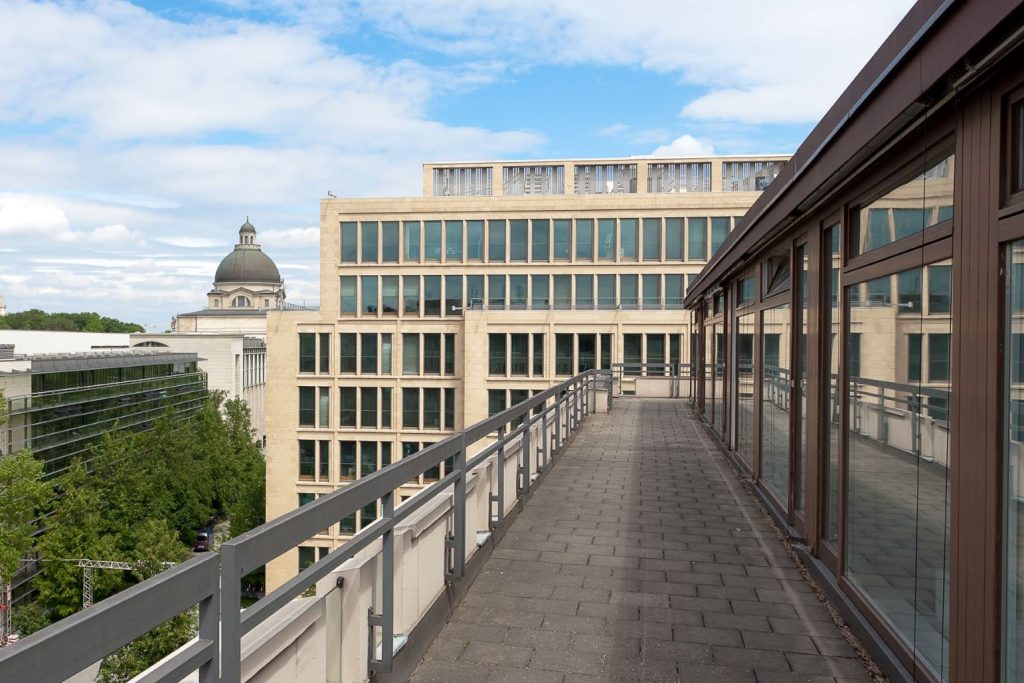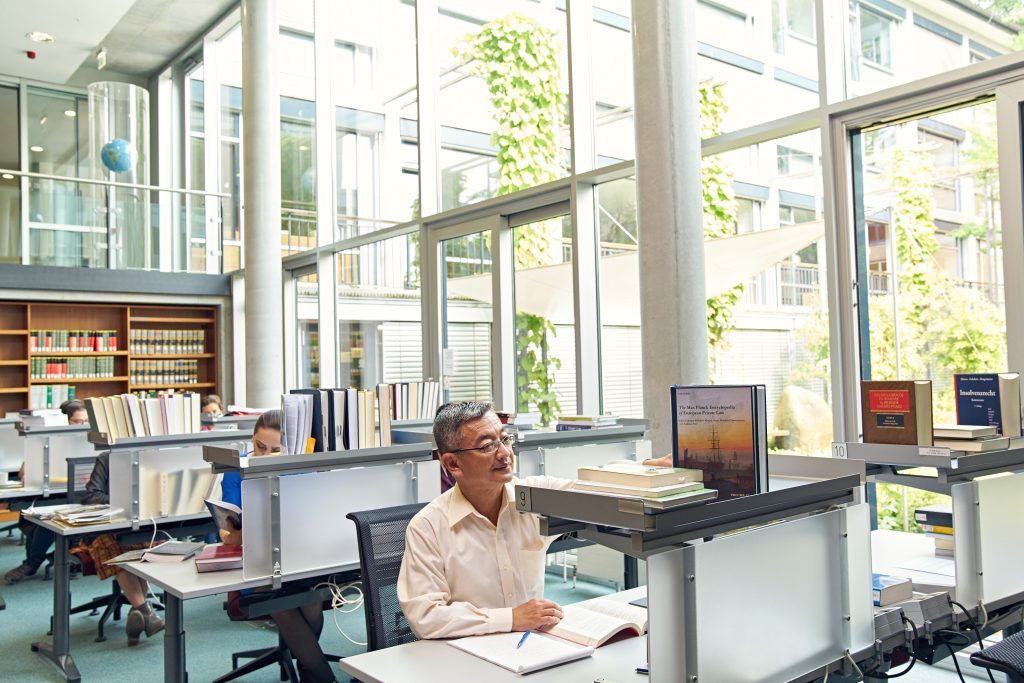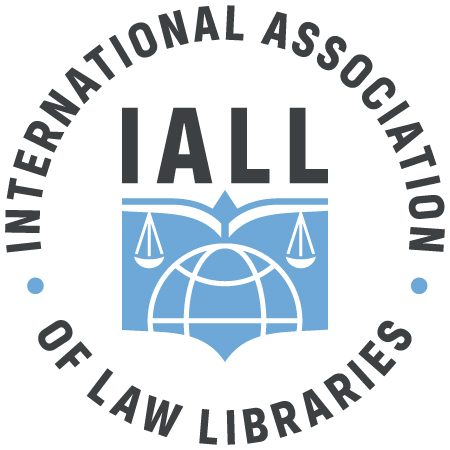By: Claudia Holland
Library Director, Library of the Max Planck Institute for Comparative and international Private Law, Hamburg
Member of the IALL Board of Directors
This year, the Max Planck Society for the Advancement of Science (MPG) celebrates its 75th anniversary. This occasions an opportunity for me look beyond the name to illuminate the significance of this society in the world of legal scholarship.
The Max Planck Society is one of four German non-university research societies. It is dedicated primarily to basic research in the sciences and humanities. It consists of eighty-five Max Planck institutes (MPIs) whose research activities complement those of universities and other research organizations. In this way, focal points are set in research areas that other institutions cannot reasonably pursue, due to their interdisciplinary nature, or because of the resources it would require.
The Max Planck Society is divided into three sections called the Chemistry, Physics and Technology Section, the Biological & Medical Section, and the Human Sciences Section. Human Sciences comprises twenty-two institutes, including five legal institutes and four that do research on legal issues, but with an economic orientation.
The legal institutes of the MPG are:
- The Max Planck Institute for Comparative Public Law and International Law (Heidelberg)
- The Max Planck Institute for Comparative and International Private Law (Hamburg)
- The Max Planck Institute for the Study of Crime, Security and Law (Freiburg)
- The Max Planck Institute for Legal History and Legal Theory (Frankfurt am Main)
- The Max Planck Institute Luxembourg for International, European and Regulatory Procedural Law
MPI Luxembourg for International, European and Regulatory Procedural Law[1] will still be well remembered as the host of the 2018 Annual Conference. Founded in 2012, it is the youngest of the institutes. As the first MPI for legal research outside Germany, it works closely with the Faculty of Law, Economics and Finance at the University of Luxembourg. The still-young library now contains over 65 000 media units.[2]
The MPI for Legal History and Legal Theory,[3] located in Frankfurt, was founded in 1964 as the MPI for European Legal History. Today it conducts basic research on the history and theory of law. Its researchers can draw on a specialist library containing more than 490 000 media units as well as a rich collection of primary works and secondary literature on the development of law in Europe, Latin America and the British Commonwealth countries.[4]
The MPI for the Study of Crime, Security and Law,[5] with headquarters in Freiburg, grew out of the foreign and international criminal law department in the law faculty at the University of Freiburg and was admitted to the Max Planck Society, in 1966, as the MPI for Foreign and International Criminal Law. Today it not only conducts basic research in criminology, public law and criminal law, it also conducts applied research with an interdisciplinary approach involving law, psychology and the social sciences. Here, too, researchers have access to a well-appointed specialist library with over 480 000 media units[6] .

The MPI for Comparative and International Private Law[7] was founded, in 1926, as the Kaiser Wilhelm Institute (KWI).[8] As a Max Planck Institute, it has always borne the same name. This institute is devoted to basic research on comparative law and private international law. Private international law, which despite its name is actually national law, is a kind of meta-law that determines which nation’s law applies to a given case, and so this requires that foreign private law must be considered, too.[9] The institute regularly delivers expert opinions for courts in Germany and elsewhere that pertain to cases pending before them. A central research tool, again, is the law library, which holds almost 550 000 media units. It is a specialized collection of writings on comparative law, private international law (or conflicts of laws), and foreign private law from more than two hundred countries and in a great variety of languages. The institute has been based in Hamburg since 1956.

The MPI for Comparative Public Law and International Law,[10] founded in 1924 as an independent entity, is the oldest of the law-oriented MPIs. It was fully integrated into the Max Planck Society’s predecessor organization, the Kaiser Wilhelm Society, by 1938. Like the MPI for Comparative and International Private Law, it was once located in the Berlin Palace, which both institutes had to vacate at the end of the Second World War. The MPI for Comparative Public Law and International Law researches international law, European law and the international protection of minorities and human rights. Basic comparative law research takes place here as well as in Hamburg, but the focus here is on German and foreign public law.[11] This institute’s library of is the largest of the law libraries in the Max Planck Society; it holds over 685 000 media units.
The following four institutes pursue research in the field of law and economics:
- The Max Planck Institute for Research on Collective Goods (Bonn)
- The Max Planck Institute for Innovation and Competition (Munich)
- The Max Planck Institute for Tax Law and Public Finance (Munich)
- The Max Planck Institute for Social Law and Social Policy (Munich)
The MPI for Research on Collective Goods[12] has developed into an international research centre, primarily for applied economics and behavioural law. The library contains over 68 000 media units from among the fields of law, economics and psychology.
Today, the MPI for Innovation and Competition[13] conducts basic legal and economics research on the processes of innovation and competition. Since it was founded in 1966, it has been dedicated to the scholarly development of intellectual property and competition law. Ten years ago, it expanded to include an economics department.[14] The library contains roughly 215 000 media units the majority of which are law-related.
Founded in 2011, the MPI for Tax Law and Public Finance[15] conducts basic research in law and economics specific to the field of taxation, including the related topics of finance and corporate law. The library, which is managed jointly with the library of the MPI for Innovation and Competition, comprises approximately 90 000 media units.

The MPI for Social Law and Social Policy[16] researches both basic questions as well as current social issues in an international context. It is dedicated to the study of interdisciplinary social policy issues from a legal and economic perspective. Its library, with specialized holdings of over 125 000 media units, facilitates this research.
All the institutes whose histories and missions have been briefly sketched here have one thing in common: they conduct basic research in an environment that is distinct and separate from the rhythms of university faculties. Most of this research is interdisciplinary, and above all it is internationally oriented. The researchers must all be well accomplished in their fields; none are working below doctoral level.
Each institute, in order to fit this bill, operates a well-furnished specialist library; and each of these libraries is internationally oriented in its own right. For example, the library at the MPI in Hamburg spends only about 15 % of its budget on German literature. The other 85 % go to acquiring foreign literature. This literature is made available to the staff of each respective institute. A common feature of these MPIs, moreover, is that visiting researchers from all over the world can come to the institutes, use the libraries, and use the spaces provided there to exchange ideas with the researchers on the institutes’ staffs. For this purpose, the library maintains work stations that can be reserved for periods of time of up to several months. These work stations are highly sought-after. Before Covid-19, for example, about 1 000 guest researchers per year were coming to Hamburg from over sixty countries to benefit from the library and the beneficial research network of which the institute is the nexus.[17] The other law-oriented MPIs are no different; their libraries are praised as:
“the heart of the four-storey building” [18] “the legal research laboratory”[19] “the one-stop shop” [20]

In terms of what is available there, the holdings of these MPI libraries overlap only to a fairly small extent. This is because the individual institutes are devoted to quite significantly different research areas. If the institutes were to be combined somehow, they would easily match the size of a law faculty or law school[21]. One could also put the holdings of the individual libraries together like pieces of a cake on a platter. The result would be astonishing: a plenary library like this would comprise over 2.8 million media units. That’s more than twice the size of the law library at Harvard.[22]
[1] https://www.mpi.lu (retrieved 20.3.2023)
[2] https://www.mpi.lu/the-institute/ (retrieved 19.3.2023)
[3] https://www.lhlt.mpg.de (retrieved 20.3.2023)
[4] https://www.lhlt.mpg.de/bibliothek/bestand (retrieved 19.3.2023)
[5] https://www.csl.mpg.de (retrieved 20.3.2023)
[6] https://www.csl.mpg.de/de/bibliothek/profil (retrieved 19.3.2023)
[7] https://www.mpipriv.de/ (retrieved 20.3.2023)
[8] The Kaiser Wilhelm Society for the Advancement of Science (KWG) was the predecessor of the Max Planck Society.
[9] Magnus p.94 in: Rechtswissenschaft in der Max-Planck-Gesellschaft, 1948–2002 (https://www.vr-elibrary.de/doi/pdf/10.13109/9783666993718)
[10] https://www.mpil.de (retrieved 20.3.2023)
[11] https://www.mpil.de/de/pub/forschung/nach-rechtsgebieten.cfm (retrieved 19.3.2023)
[12] https://www.coll.mpg.de/2541/de (retrieved 20.3.2023)
[13] https://www.ip.mpg.de (retrieved 20.3.2023)
[14] https://www.ip.mpg.de/de/das-institut.html (retrieved 20.3.2023)
[15] https://www.tax.mpg.de/ (retrieved 20.3.2023)
[16] https://www.mpisoc.mpg.de/ (retrieved 20.3.2023)
[17] S. Annual library reports: https://www.mpipriv.de/bibliotheksbericht (retrieved 20.3.2023)
[18] https://www.csl.mpg.de/geschichte (retrieved 19.3.2023)
[19] https://www.mpg.de/205349/bibliothek (retrieved 20.3.2023)
[20] https://www.lhlt.mpg.de/bibliothek (retrieved 19.3.2023)
[21] The institutes mentioned here have come together in a network called Max Planck Law: https://law.mpg.de/
[22] https://hls.harvard.edu/history-of-the-library/ (retrieved 20.3.2023)
This Blog contains entries by members of the International Association of Law Libraries on issues germane to the Association’s areas of focus. Views expressed in an individual entry only represent the views of the author.
